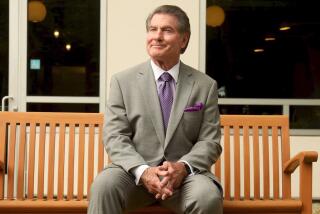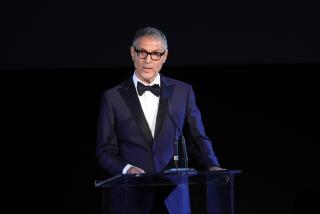Fund-Raising Superstar Sally Fleg : She Finds the Big-Money Donors for Hebrew University
- Share via
Veteran publicist Lee Solters tells this story about fund-raiser Sally Fleg: Two men are shipwrecked on a desert island. One frantically sends smoke signals to attract a stray aircraft, while the other lounges about. Finally the first man, exhausted from his efforts, asks the other why he isn’t doing anything that might help save them. Casually he replies, “I just pledged $100,000 to Hebrew University. Sally Fleg will find me.”
Fleg was reminded of the story one day recently while sitting in her Wilshire Boulevard office. She placed her fingers carefully on her temple as a slight smile crept across her face. “I think Lee is taking a bit of a license there. He gets that because at board meetings I always bring people back to the issue (money). People say, ‘There she goes again. That’s all she ever thinks about.’ ”
Maybe not all , but a good deal. Despite the Borscht Belt humor that’s used to describe her personality, Fleg is no-nonsense. Her 18-year salaried post as director of the Western States Region of American Friends of the Hebrew University has practically everything to do with money, as in raising it. And Fleg is very good at that, making the Western region the second-highest grossing area (New York is first) of the 39 international chapters.
‘Very Competitive’
The diminutive woman with carefully coiffed blond hair possesses a healthy amount of confidence about her accomplishments: “I’m very competitive,” she said matter-of-factly. “I’m an achiever. I like to strive for No. 1. It doesn’t mean I always make it, but I like to strive for that.”
During her tenure as director enough money has been raised to pay for a long list of buildings and services: 10,000 student scholarships, 15 research chairs, 15 buildings (including dormitories, classrooms, libraries, student centers) and six plazas and gardens on the Mt. Scopus campus and at least 10 more buildings on other campuses.
Hebrew University’s 17,000 students are spread out over four campuses: Mt. Scopus, which is the main campus, Givat Ram and Ein Karem in Jerusalem; and Rehovot, outside of Tel Aviv. The university boasts the only agriculture school in Israel, and has programs in computer science, veterinary medicine and chemistry. Its size is second only to Tel Aviv University, which has 20,000 students.
Building names read like a page out of Who’s Who. There is the Emanuel Streisand Building, which is named for Barbra’s father, the Frank Sinatra International Student Center, the Mehli Mehta and Zubin Mehta Music Wing, the Nancy Reagan Plaza, and the Ralph Bunche Gardens, a gift of MCA president Lew Wasserman. The American Friends have never been without big-name Hollywood support (Gregory Peck, Dinah Shore, Steve Lawrence and Eydie Gorme to name a few), a necessity in the competitive world of fund raising.
Fleg also brings 100 to 200 supporters to the campus every year on an annual trek she calls a “caravan.”
The secret of success is in gaining contributors who may never set foot on the campus, let alone have a building named after them. When asked how she does it, she paused a moment before launching into The Pitch: “If you had never been to Israel, certainly you live in this city where there are universities with young people, and you understand what they’re doing. You understand how important education is. I don’t think the concept of the physical structure is as easy to bring to them as the need for scholarships, or even money for research. Everyone understands how important research is.”
Hair-care magnate Vidal Sassoon, a past president of this region of American Friends, described the motivational technique Fleg uses with him: “She’ll say, ‘So-and-so is in town. Go after him.’ It’s that kind of thing. Get to the person who can do the most good, and do it efficiently. But not just for the cash--make them aware of why they’re giving, why they’re involved. And she has a marvelous nose for where the money is.”
Fleg found another way to bring the university to Angelenos: She flies in Hebrew University professors to Los Angeles each year for a conference. At a national board meeting scheduled for April in Palm Springs, the roster includes Knesset member and former Foreign Minister Abba Eban and several professors; the emphasis will be on hunger.
Despite her accomplishments, Fleg said, “I never considered myself a fund-raiser. I always thought I was doing what I was supposed to do. The money was never asked for me, for anything personal. It was always something that I was doing for . . . Israel. It became a driving force in my life, a lifetime commitment. I have always felt it did more for me than I did for the cause.”
Youth Meeting
Fleg’s commitment to Israel came about 40 years ago when she attended a meeting of Youth Aliyah, a program that brought children of parents killed in the Holocaust back to Israel.
“It was the first time I had heard about this,” she said, “and at the meeting I stood up, and I didn’t have any money, but I pledged $1,000 and the audience went, ‘What?’ I immediately realized that that’s where I belonged. It was a feeling I had inside. It motivated me from that point on to really dedicate my life, whatever time I had, to Israel.”
At the time of this mini-epiphany she hadn’t even been to Israel; that would happen in 1960. Her first impressions of the country? “There is a sadness, but you always felt the joy because there was laughter and happiness in spite of all the problems. And of course that’s a part of our heritage, too--acceptance and doing something the best way you can. Every time I go back I love it. It’s like . . . an injection .”
Her affinity with the country predates the Aliyah meeting; her parents, furriers who emigrated from Austria and Hungary to Chicago, were involved with Jewish organizations. The family moved to Los Angeles and Fleg was graduated from USC. After marrying she started her charity work. Her late husband, Julian, was a rabbi who later turned to the business world. “He still did his stint for Israel. He always answered the call.”
From Aliyah she went on to become president of Beverly Hills Hadassah (a Jewish women’s service organization), chairwoman of the women’s division of State of Israel Bonds, chairwoman of the speakers bureau of the women’s division of the United Jewish Welfare campaign and chairman of the women’s division of the American Technion Society, the support group for the Israeli Institute of Technology.
Her Mentors
Through Hadassah she met two of her mentors, philanthropists Lou Boyar, who is now deceased, and Sam Rothberg, currently honorary chairman of the board of Hebrew University. They enlisted her help with Israel Investors Corp. in selling $20-million worth of Israeli stocks to Americans, a task done in less than a year, and with her 1 1/2-year-old daughter in tow.
After that Rothberg insisted she help with Hebrew University. “I thought six months, a year, and that will be it. Now that turns out to be 18 years. In Hebrew, the number 18 is chai , that means life. It’s going to be a good year.”
She started with few supporters in a region that consisted of everything west of Texas. That has since been divided up, and Fleg now presides over Southern California, Hawaii, Colorado and Arizona. Contributors number about 12,000, and Fleg spends at least a third of the year on the road. Most of her traveling is done in short spurts--two days in Israel, a day in Palm Springs. She loathes dragging anything out longer than necessary.
Along the way she acquired another mentor, the late Israeli Prime Minister Golda Meir, with whom she’d chat about university matters and their children.
Last year ended on a good note for Hebrew University. In December the Friends hosted the annual Scopus black-tie gala that honored director Steven Spielberg and also drew in pals like Michael Jackson, George Lucas, Quincy Jones, Whoopi Goldberg, Harrison Ford and Richard Dreyfuss. A little more than $1 million was raised from that night to fund more scholarships.
With a commitment to her job that takes up seven days of the week, Fleg said she has little time for anything else but her three grown daughters. Not having a social life outside of work is no tragedy. “I’m doing so many things socially--going to dinners, luncheons--that after a while I’m very happy to come home, go into my own little room and listen to music.”
One goal eludes her: organizing a charity concert, a la Live Aid, to reach “millions of people on all levels. I thought that concert was amazing. That sort of thing brings out the best in all people. And maybe, maybe, maybe, it may come to pass.”
More to Read
The biggest entertainment stories
Get our big stories about Hollywood, film, television, music, arts, culture and more right in your inbox as soon as they publish.
You may occasionally receive promotional content from the Los Angeles Times.










